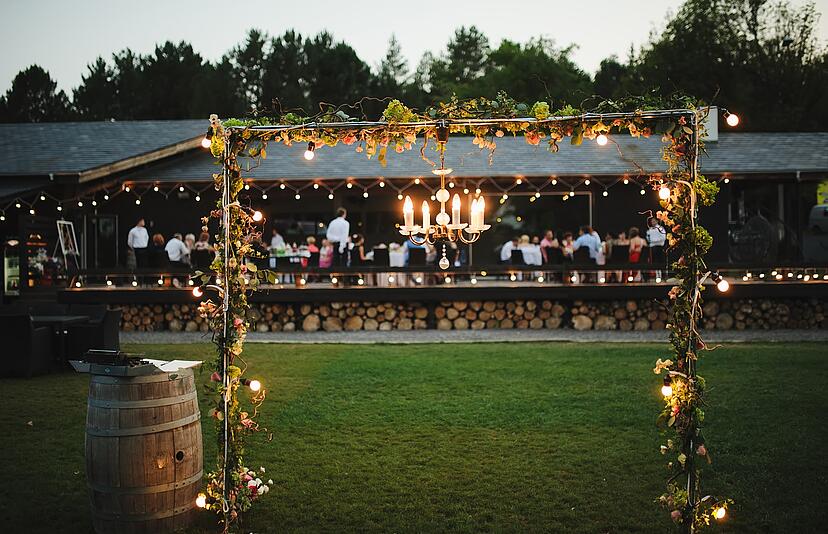Successful event planning and implementation
Last updated: February 2024
Anyone who has ever organized events themselves knows the situation. Event planning is exciting and versatile. After all, no event is like any other, and this is precisely what makes live communication so interesting. However, organizing events can quickly become a personal test of one's nerves and a significant burden. The reasons for this can be manifold; poor planning, wrong timing, scheduling conflicts, cancellations of event locations / event service providers, too few registrations, bad weather, illness-related absences, technical problems, or insufficient staff. These are just a few examples.
Calculable & unpredictable factors
There are many calculable risks that can be avoided with professional planning. More about these factors in the next chapter. There are still those factors over which you have no direct influence, such as the weather, unscheduled cancellations, absences due to illness, etc. The most important thing here is to keep a cool head. The most important thing here is to keep a cool head. Of course, this is easier said than done. Therefore, where possible, plan B variants should be worked out at an early stage. This helps to maintain planning even in the case of unforeseeable events. The most important thing, however, is to accept the situation, analyse it calmly and then make the best of the given situation.
Guidebooks & checklists to support you before, during and after events
As mentioned, with few exceptions, event organisation is calculable and event planners have a direct influence on the success of an event. A lot can be achieved with early and professional planning. There are numerous helpful guides, checklists and best-practice examples on the internet. We have provided a compact guide for you. In addition, we have listed further external sources with - from our point of view - very valuable and comprehensive checklists and tools.
Event planning:
Basic decisions before the event
- Define event goal(s)
- Determine target audience (guests)
- Find a "red thread" for the event and then implement it consistently.
- A special event motto has an impact on the entire planning (decoration, dress code, menu, drinks, furniture, entertainment, etc.).
- Determine the date (it is essential to check in advance whether other relevant events are already taking place on this date. Also avoid the event falling during school holidays or on a public holiday).
- If necessary, define an alternative date.
- Determine the key data of the event (duration, number of participants, budget, etc.)
- Determine space and infrastructure requirements
- Determine the location of the event
- Make sure that it is easily accessible for all invited guests (travel time, public transport, parking spaces, etc.).
- Identify a suitable event location
- It is essential to make reservations early and, if not yet known, to personally reconnoitre on site.
Rough planning before the event
- Work out event concept with budget and key data (schedule, dates, budget, etc.)
- For corporate events, submit the concept and budget to the management for approval (for private events, preferably discuss with the partner...).
- Determine project organisation (who does what and by when - responsibilities, areas of responsibility, rough deadlines, substitutes etc.)
- Determine the schedule
Event detail planning
- Define procedures
- Determine programme / motto etc.
- Definitely reserve event location, define details and conclude contract
- Evaluate event service providers and conclude contracts (catering, entertainers, photographers, furniture, technology, transport, decoration, etc.)
- Determine event activity / supporting programme and select a suitable offer (event idea)
- Organise catering (internal/external), determine menus & beverages and organise appropriate quantities
- Organise arrival/departure (signposting, organised transport, timetable, parking spaces etc.)
- Furnishings/infrastructure (internal/external), test technology in advance, set up infrastructure in good time
- Draw up security concept (external personnel, emergency exits, ambulance, security service, etc.)
- Promotional measures (invitation cards, advertising, customer gifts, thank-you mailings, etc.)
Procedure at the event
- Brief & instruct staff for the event day in good time (internal & external)
- Clearly allocate tasks
- Set up technology, furniture & infrastructure incl. testing (dress rehearsal)
- Inventory and record on list
- Reception, welcome and support of guests and other persons (entertainers, moderators, etc.)
- Regularly check the schedule/procedure
- Thanking and saying goodbye to the guests after the event (organisation of return transport etc.)
Immediately after the event
- Dismantling of furniture/technology/infrastructure
- Disposal
- Organise cleaning
- First manoeuvre critique
After the event
- Debriefing to internal staff and external partners
- Check inventory
- Carry out accounting and budget reconciliation (TARGET/ACTUAL)
- Thank you email/letter to guests (photo gallery, survey/feedback)
- Record feedback from manoeuvre critique, debriefing, customer and supplier feedback in writing and incorporate it into the event planning/checklist for future events. Practice makes perfect and the experiences gained as well as internal and external feedback are very helpful for the organisation of further events.
Further helpful checklists are available on the internet, which we would like to recommend to you:
- Various checklists with a comprehensive event concept (Source: Samariterverbund)
- Detailed checklist for planning, organising and realising events (Source: Event Agency Bonnot's Event House)
- Helpful checklist for the realisation of an event - nicely divided into the strategy phase, the realisation of the event and the debriefing (Source: Gryps.ch)
Of course, there are countless other helpful checklists. Depending on the type of event, size and budget, there are different guides. You can find them with just a few mouse clicks on the web.
In our "Checklists & Tips & Tricks" section you will also find helpful guides as well as links to corresponding checklists.
For example, for wedding planningor for the efficient use of social media at events. If you are looking for suitable locations, service providers and event ideas for an upcoming event, we recommend our latest event planner. We have prepared a special wedding planner for you on the topic of weddings. Tips and tricks for wedding planning can be found here. We wish you every success in planning your upcoming events!










